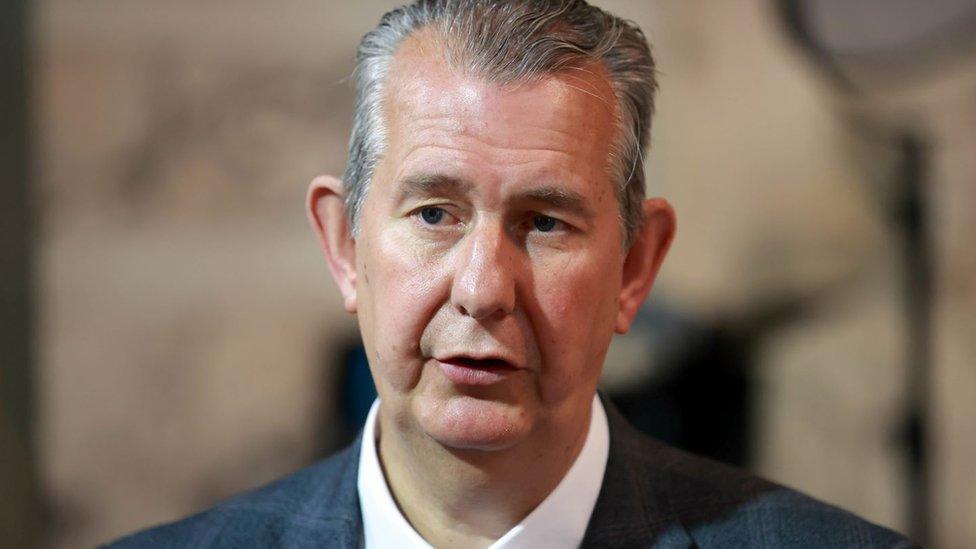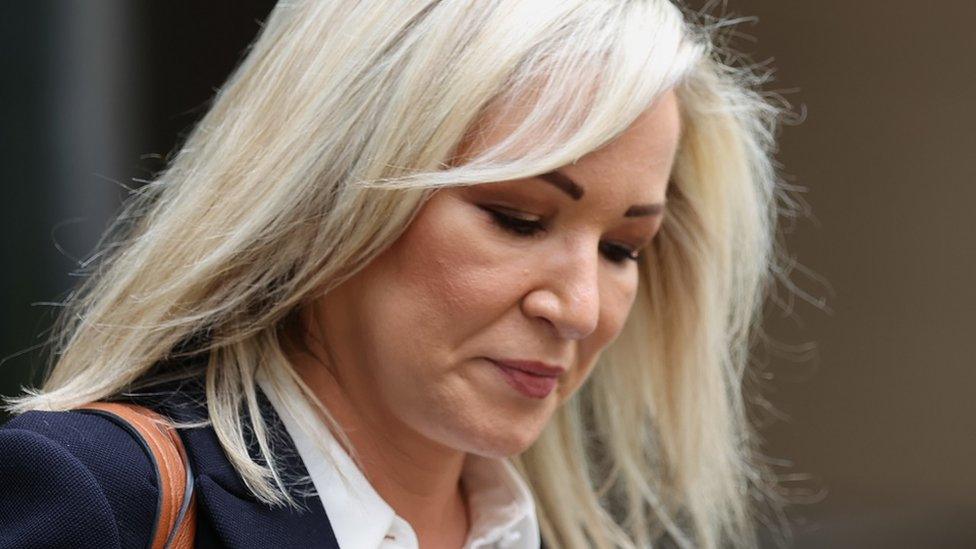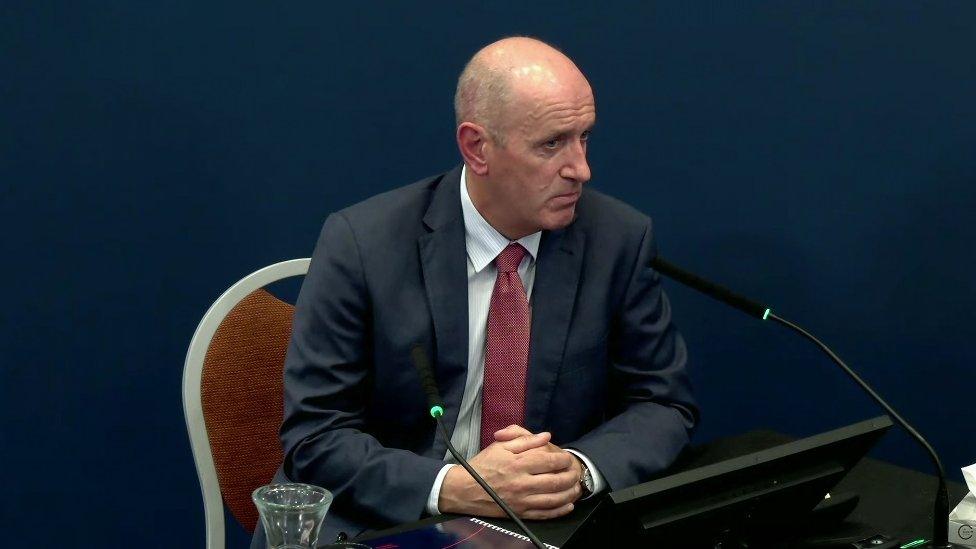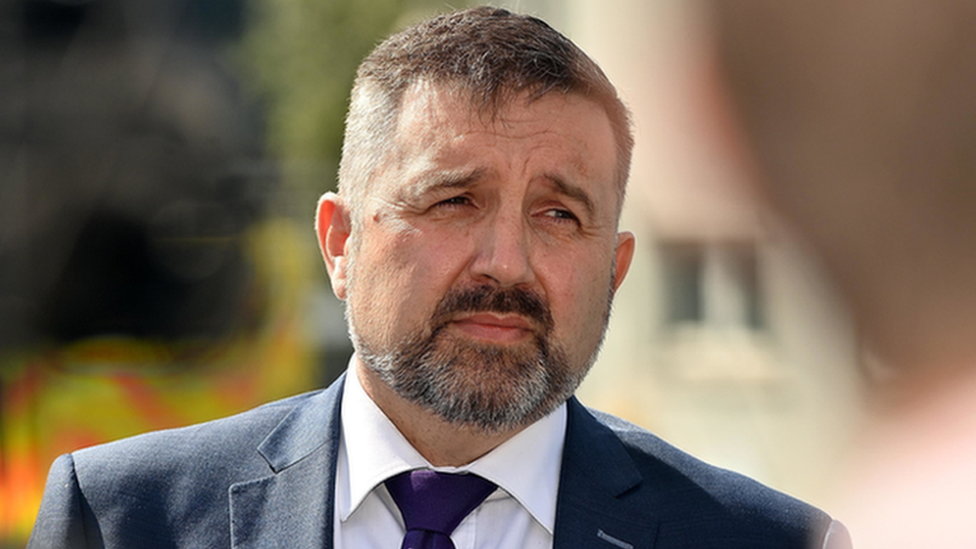Covid Inquiry: Foster rejects suggestion of pandemic 'sleepwalking'
- Published
Baroness Foster rejects 'sleepwalking into pandemic' claims
Former first minister Baroness Foster has rejected suggestions the Northern Ireland Executive "sleepwalked" into the pandemic.
The claim was put to her by counsel at the UK Covid-19 inquiry.
Clair Dobbin KC said it was "really difficult" to understand why basic response plans were not activated by the time the pandemic was declared.
Baroness Foster said the idea "we would expose constituents to this in a wilful way is just offensive, frankly".
She said she "totally and and absolutely" rejected the claim, as the executive had been determined to work for the people of Northern Ireland.
The former first minister insisted the executive had been receiving advice from health officials, and that the Department of Health was taking the lead on the initial response to the virus.
Baroness Foster was Northern Ireland's first minister from 2016 to 2017 and during the pandemic from January 2020 until she resigned on 14 June 2021.
She was leader of the Democratic Unionist Party (DUP) from 2016 to 2022.
Earlier, she told the inquiry she accepted responsibility for how the executive handled the Covid pandemic, saying Northern Ireland should have locked down sooner than it did to prevent more deaths.
But she added: "We felt we had time and we didn't have time, and that's a source of great regret."
What did Arlene Foster tell the Covid Inquiry?
This is not the first time Baroness Foster has appeared before the inquiry.
In July 2023 she said the UK government should have stepped in to make decisions in the absence of ministers at Stormont from 2017 to 2020.
Health officials have said the absence of ministers impacted the preparedness for health emergencies.
On Wednesday, Baroness Foster told the inquiry she agreed with comments by Michelle O'Neill, who is now first minister but was deputy first minister from January 2020 until February 2022, that there was "by and large no real oversight" at Stormont around planning for the early stages of the pandemic.
But she told the inquiry she felt she had given the leadership required during her time as first minister.
"It was probably the most difficult period of my political career, dealing with Covid was the most challenging, but we tried to put our best foot forward," she added.
The inquiry also heard Baroness Foster questioned about her party's controversial use of a cross-community vote mechanism in autumn 2020, to prevent some Covid rules from being extended.
The tense four-day executive meeting has already been the focus of evidence from other witnesses, who criticised the DUP for using it as a means of vetoing the measures.
'It saddens me greatly'
The inquiry was shown a text message sent by the chief medical officer on 10 November 2020, in the midst of the debate.
He described it as "politics at its worst" and that they should "hang their heads in shame", although he did not refer to anyone in particular.
Ms Dobbin put it to Baroness Foster: "When you see those views from a senior official - the chief medical officer set out in black and white in relation to one of the most critical junctures of the pandemic - does that cause you a moment of reflection about the leadership you offered?"
Baroness Foster replied: "More than a moment's reflection, the chief medical officer like all of us was exhausted by that stage, he worked so diligently for the executive through the pandemic.
"It saddens me greatly to see those text messages and brings me back to what we were going through - it was an incredibly difficult point."

During the pandemic, former DUP minister Edwin Poots had claimed transmission of the virus was higher in nationalist areas
Baroness Foster was also asked about the comments of former DUP minister Edwin Poots when he claimed transmission of the virus was higher in nationalist areas.
In October 2020, Mr Poots sparked a backlash after saying the difference in transmission between nationalist and unionist areas was "around six to one", but later insisted he did not link the virus with religion.
Baroness Foster was asked whether she in any way sought to sanction or stop him at the time in her role as DUP leader.
She replied: "Edwin is very much his own person in terms of his opinions, however it's not a view I shared and he knew it was not a view I shared - and indeed it wasn't a view shared by the other DUP ministers either."
'Blunt tool'
She also accepted that damage was done to public confidence by the DUP's use of the cross-community vote to block some restrictions from being extended in autumn 2020.
She described it as a "blunt tool" but one that she felt was necessary at the time.
However she said she regretted the executive ended up in that position, adding that "relationships almost broke down".
"It was difficult to watch from the outside but it was torturous inside and I hope we never get to a position of a four-day meeting of the executive again," she told the inquiry
Card and gifts
On Tuesday Ms O'Neill appeared at the inquiry.
During the hearing she apologised for attending senior republican Bobby Storey's funeral during lockdown, when she was serving as deputy first minister.

Current NI first minister Michelle O'Neill appeared at the inquiry on Tuesday
The former first and deputy first ministers fell out over the funeral, with the then DUP leader abandoning their joint news conferences for around two months.
However, they ended their sometimes difficult political relationship on good terms according to Whatsapp messages released by the inquiry.
The day before Baroness Foster's resignation as DUP leader following an internal coup, Ms O'Neill sent her a text saying: "I'm genuinely sorry if you don't get to bow out the way you had planned. Politics is certainly not an easy path."
Baroness Foster replied: "Thanks Michelle. Just felt you should know."
Three weeks later the former DUP leader thanked Ms O'Neill for a card and gifts prompting the reply: "You are welcome. Take care."
Storey funeral 'undermined confidence'
The former Police Service of Northern Ireland (PSNI) officer who led the police response to the pandemic also appeared at the inquiry on Wednesday.
Alan Todd was an assistant chief constable and in March 2020 he was placed in charge of day-to-day policing of the pandemic.
He defended the PSNI's handling of the funeral of Mr Storey, but he said those who attended breached Covid rules and that he did not believe there was a "policing solution" to it.
"The event undermined confidence in the very people making the regulations and it was never going to make it easier for the body charged with enforcing them [the PSNI]," he added.

Former PSNI assistant chief constable Alan Todd appeared before the UK Covid-19 Inquiry on Wednesday
Mr Todd also expressed concerns that the police became the "lightning rod" for people questioning or asking for explanation of sometimes confusing Covid regulations.
"The number of media interviews I was being asked to do, to explain regulations I didn't write and outline guidance I wasn't given, we felt was becoming an increasing risk for us as a police service," he told the inquiry.
Despite PSNI requests for support from other government bodies such as councils to help enforce regulations, Mr Todd said: "Police felt there wasn't a long queue of people lining up to help them."
- Published13 May 2024

- Published14 May 2024